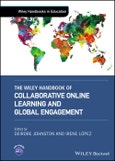Presents best practices for faculty and administrators developing globally-connected courses, including learning objectives, collaborative assignments, and logistical planning
As political instability, pandemic risks, rising costs, new requirements for experiential learning, and other factors make it increasingly difficult for students to study abroad, there is growing interest in globalizing and internationalizing the curricula of colleges and universities worldwide. The Wiley Handbook of Collaborative Online Learning and Global Engagement is designed to help educators develop and conduct high-impact, globally-connected courses across the humanities, the fine arts, and the social and natural sciences.
This comprehensive guide covers collaborative practices, course design variables, student learning approaches, logistical planning, and more. An international team of contributors from diverse geographic, cultural, and academic backgrounds offer insight into enhancing pedagogical practice, coordinating study abroad experiences, and promoting both students' and faculty's global competencies. Throughout the text, numerous real-world case studies, interactive and experiential assignments, sample syllabi, course bibliographies, and links to web and media resources reinforce best practices for course design, learning objectives, and pedagogy development. Based on a detailed assessment of 500 students in collaborative courses across 14 countries, this innovative guide:
- Covers co-development of learning objectives across different courses, disciplines and cultural contexts, co-coordination of course content, technology, and resources, and intercultural learning assessment
- Explores new and innovative ways to engage students in distant locations in collaborative learning
- Provides advice for overcoming logistical challenges, managing group dynamics, controlling costs, and implementing connected courses with limited resources
- Discusses the impact globally-connected courses have on cultural curiosity, knowledge, strategy, and behavior
- Offers approaches for addressing cultural transgressions and miscommunication, and for collaborating with other faculty members across cultures and educational systems
Featuring multiple cultural perspectives and international contexts, The Wiley Handbook of Collaborative Online Learning and Global Engagement is a valuable guide and reference for faculty and administrators involved in teaching, planning, implementing, or assessing courses with global learning outcomes.
Table of Contents
Part I Introduction 1
1 Connecting Beyond the Classroom: Why You Should Be Globally Connecting Your Courses and How It Benefits You and Your Students 3
Deirdre Johnston and Irene López
2 How Can I Do A Globally-Connected Course? A Short Primer Based on Past Globally-Connected Courses 18
Simon J.M. Gray
3 Assessment of Globally-Connected Courses: How Successful Global Course Connections Can Make Your Students Less Anxious, Smarter, and More Culturally Competent 36
Irene López and Deirdre Johnston
Part II Case Histories 53
Development of Global Self-Awareness 55
4 Yearning Toward Community: Gaining Global Awareness Through Conversations on Literature 57
Patricia Bloem
5 In Between Dreaming and Insomnia: A Cyber-Dialogue Dance Project 76
Julie Brodie and Laura David
Perspective-Taking 93
6 I Am Because We Are: Discovering Self and Others Through Study of Global Conflict 95
Deirdre Johnston and Dagmar Kusa
7 Seeing the World Through the Eyes of Others: Learning Perspective-Taking Through Storytelling 117
Emilienne Idorenyin Akpan and Joshua Searle-White
8 Cross-Training and Perspective-Taking: The Development of an Oral History Project in the Sciences and Humanities 128
Taylor Allen and Kim Fox
Understanding Cultural Diversity 139
9 What Do These Students Think of Us? Managing Intergroup Anxiety in a Virtually-Connected Course 141
Irene López and Wejdan Felmban
10 Physical Embodiment of Culture Through Movement 161
Balinda Craig-Quijada and Priya Joshi
Development of Personal and Social Responsibility 177
11 Beyond Grades: Advancing Global Learning Through Personal and Social Responsibility in A Globally-Connected Peace Journalism Course 179
Jacob Udo-Udo Jacob and Wajiha Raza Rizvi
12 Developing a Global Mindset in Business Education: Supporting Personal and Social Responsibility 195
Vicki L. Baker and Antonis Klidas
Knowledge of Global Systems and Global Contexts 211
13 Service-Learning as a Catalyst for Global Learning and Civic Engagement: A Collaborative Pedagogical Experiment 213
Gina Annunziato Dow and Karla Díaz
14 Nurturing Global Problem Solvers: An Action Research Approach to Instructional Design 230
Chong Xiao and Wing Fung Chan
Part III Future Directions 247
15 Best Practices for Collaborative Online Learning and Global Engagement 249
Irene López and Deirdre Johnston
16 Expanding Our View of Global Learning Outcomes 264
Deirdre Johnston and Irene López
17 Making Global Course Connections an Institutional Priority 294
Deirdre Johnston and Irene López
Appendix 1: Global Learning VALUE Rubric 305
Appendix 2: Intercultural Knowledge and Competence VALUE Rubric 309
Appendix 3: Example of Travel Seminar Connected to Global Course Partnership 313
Appendix 4: Examples of Memoranda of Understanding for Institutional Global Partnerships 357
Index 372








